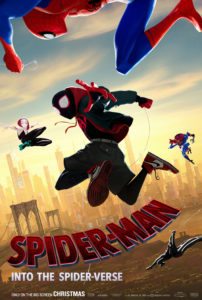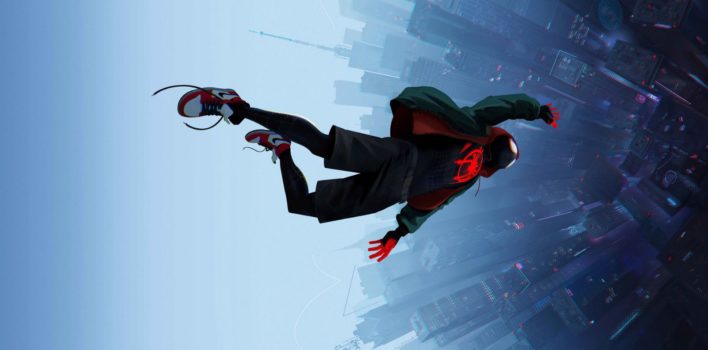Review| Spider-Man: Into the Spider-Verse
 If the year of 2018 in film has a theme, that theme is definitely superheroes. Depending on your definition of “superhero,” there have been between seven and fifteen blockbusters in the genre over the last twelve months, with another one dropping later this week. So in a year dominated pretty overwhelmingly with superhero films, a year that gave us movies like Black Panther, Venom, and Avengers: Infinity War, the sudden and glowing reviews of Spider-Man: Into the Spider-Verse are more than a little bit of a surprise.
If the year of 2018 in film has a theme, that theme is definitely superheroes. Depending on your definition of “superhero,” there have been between seven and fifteen blockbusters in the genre over the last twelve months, with another one dropping later this week. So in a year dominated pretty overwhelmingly with superhero films, a year that gave us movies like Black Panther, Venom, and Avengers: Infinity War, the sudden and glowing reviews of Spider-Man: Into the Spider-Verse are more than a little bit of a surprise.
And, let’s be clear: the positive reviews are well-earned. The Spider-Verse is filled with strong and compelling heroes and villains, sublime voice work, beautiful and somewhat groundbreaking animation, and a fresh take on the character that still honors and acknowledges its history. Its entire history, for better or for worse.
The heroes are more complete and believable than anyone a live-action Spider-Man film has ever given us; from writing to performance to animation, each of the six Spiders in in the story are really likable, unique in fundamental ways, and yet clearly share a common experience. The villains, likewise, have serious depth that I wasn’t expecting; not like Thanos, but the depth that you only usually see in real people dealt a bad hand. They’re not mustache-twirlers, and they’re made all the scarier by their realism.
Audibly, the film is thrilling. The music is great, but the voice work is even better: Shameik Moore, Hailee Steinfeld, and Jake Johnson inhabit their respective Spiders perfectly. Seeing Miles’ life was one thing, but hearing him interact with his world and the other Spiders carries a particular kind of verisimilitude. John Mulaney hits a perfect note somewhere between Mel Blanc and John DiMaggio. And “I really want to see Nicolas Cage as Spider-Man Noir in a standalone film” is a sentence I never thought I’d say with any genuine hope.
Visually, the film is even more groundbreaking. It’s not 3D animation, but it’s also not traditionally animated. It feels like a comic book on screen, but it has more flowing motion and realism to it than I’ve seen in animation recently. It’s not a motion comic, but it’s not a cartoon. It’s not silky-smooth, but it’s not jerky. The animation is gorgeous and eye-catching, but still somehow manages to vanish beneath the strength of the story. Cinematography, color, and lighting likewise represent a triumph of animated filmmaking.
But the best part of the film was their explanation of what makes a hero: Spider-Man, the film insists, always gets back up again.
Note: Spoilers for Into the Spider-Verse follow.
Always Get Up
 It kind of makes sense. Batman is always the smartest, most prepared guy in the room; that’s what characterizes him. Superman is always, well, super. Captain America is always brave. The Hulk is characterized by his anger. And what makes Spider-Man special, whether he’s a teenage girl from the 31st Century or a black Puerto Rican from Brooklyn, is that Spider-Man always gets back up again.
It kind of makes sense. Batman is always the smartest, most prepared guy in the room; that’s what characterizes him. Superman is always, well, super. Captain America is always brave. The Hulk is characterized by his anger. And what makes Spider-Man special, whether he’s a teenage girl from the 31st Century or a black Puerto Rican from Brooklyn, is that Spider-Man always gets back up again.
The other Spiders tell Miles stories about the times they had to get back up again; whether knocked down by a villain, or by their own failure, or by a tragic loss. Miles’ test to see if he’s ready to be Spider-Man is a test to see if he’ll get back up from being tied down in a chair. They don’t choose when to get knocked down, but they do choose when to get back up again.
And if anyone can wear the mask, as both Mary Jane and Miles promise throughout the film, then the true mark of a hero is what they do when they’re knocked down. So what knocks you down? And what gets you back up again?
Getting Up Again
The Peter Parker from Miles’ universe tells us that he always got up because he was the only one standing between the city and its destruction. For the older Peter Parker, it was a duty he was kinda tired of. Gwen Stacy had a driving desire to never again let anyone down like she had let her best friend down.
 And for Miles Morales, it was his dad’s confidence in him. Even tied up by spider thread on the other side of a locked door, his dad’s expression of confidence and love provided the motivation Miles needed to get back up again, to pass his test.
And for Miles Morales, it was his dad’s confidence in him. Even tied up by spider thread on the other side of a locked door, his dad’s expression of confidence and love provided the motivation Miles needed to get back up again, to pass his test.
What gets you back up again? And what gives you hope?
Hope to Get Up
Whatever it is that gets you back up, you need hope. Hope that it will be different, better when you stand up. Hope that you won’t be standing up to an even worse failure. Hope in something rock-solid, something that won’t let you down.
Without hope, the alternate-universe Peter Parker had become a shell of his former self; he’d put his hope in his wife; when things got rocky, he fell apart and lost hope. The Peter Parker from Miles’ universe had hope in his ability to win the day; but in his final battle, that hope was, quite literally, crushed.
 Miles found hope in the place where he ran after he watched Peter Parker die: his family. The love of his parents distilled in him a willingness and ability to go on, and fueled him to become who he was meant to be. As sources of hope in superhero films go, that’s pretty good.
Miles found hope in the place where he ran after he watched Peter Parker die: his family. The love of his parents distilled in him a willingness and ability to go on, and fueled him to become who he was meant to be. As sources of hope in superhero films go, that’s pretty good.
But would it be enough for you? Where is your hope? Is it solid? Is it permanent? Is it pinned on Earthly things, or transcendent things?
Does Whatever a Spider Can
Into the Spider-Verse succeeds on every level: a narrative level, a performance level, a technical level, and even a philosophical and theological level. But perhaps the best way it succeeds is that it makes me excited about Spider-Man films again for the first time in decades, and makes me think big thoughts about the webslinger again.
It’s been a long time and many universes since that happened. And it’s not the hope that gets me up again, but I have hope that this is just the first of many great Spider-Man films on the way.









Pingback: My Top Ten 2018: Fizz | Reel World Theology
Pingback: #195 – Into the Spider-Verse and Positive Motivation | Reel World Theology